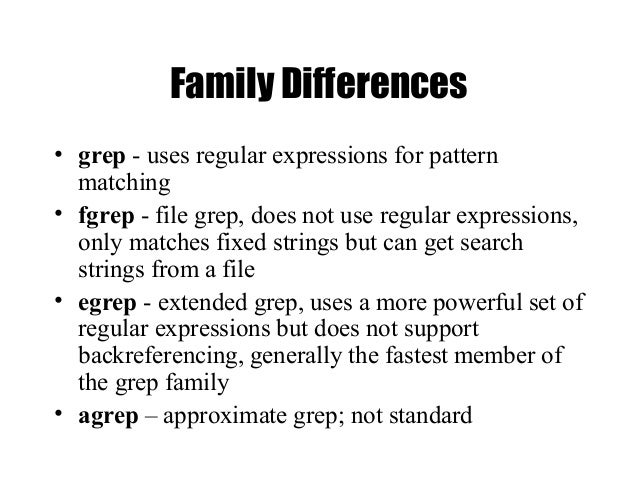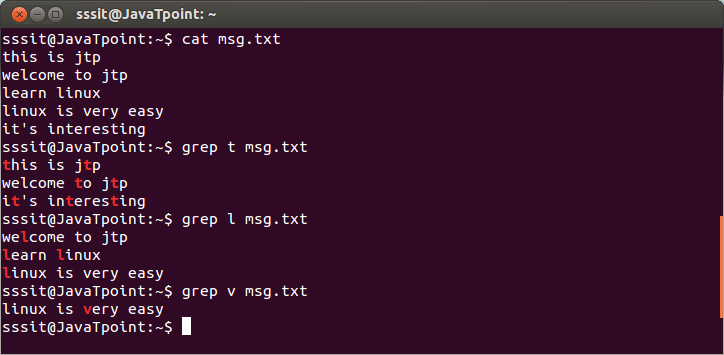

#GREP REGULAR EXPRESSION WINDOWS#
Tr - Translate, squeeze, and/or delete characters.Įquivalent Windows command: FINDSTR - Search for strings in files.Grep is a Linux / Unix command-line tool used to search for a string of characters in a specified file. Grep - Search file(s) for lines that match a given pattern. Gawk - Find and Replace text within file(s). "I stand for freedom of expression, doing what you believe in, and going after your dreams" ~ Madonna CicconeĮgrep - Search file(s) for lines that match an extendedįgrep - Search file(s) for lines that match a fixed Backreferences are very slow, and can require In addition, certain other obscure regularĮxpressions require exponential time and space, and might cause grep to + The preceding item will be matched one or more times. * The preceding item will be matched zero or more times. ? The preceding item is optional and will be matched at most once. Of a word, and \B matches the empty string provided it's not at the edge of a word.Ī regular expression can be followed by one of several repetition operators: The symbol \b matches the empty string at the edge \ respectively match the empty string at the beginning and end of a word. The caret ^ and the dollar sign $ are metacharacters that respectively match the empty string at the beginning and end of a line. The symbol \w is a synonym for ] and \W is a synonym for Finally, to include a literal - place it last. To include a literal ] place it first in the list. Metacharacters lose their special meaning inside lists. (Note that theīrackets in these class names are part of the symbolic names, and must be included in addition to the brackets delimiting the bracket list.) Most

For example, ] means, except the latter formĭepends upon the C locale and the ASCII character encoding, whereas the former is independent of locale and character set. Their names are self explanatory, and they are LC_ALL environment variable to the value C.įinally, certain named classes of characters are predefined within bracket expressions, as follows.

To obtain the traditional interpretation of bracket expressions, you can use the C locale by setting the Many locales sort characters in dictionary order, and in these locales is typically not equivalent to it For example, in the default C locale, is equivalent The two characters, inclusive, using the locale's collating sequence and character set. It matches any single character that sorts between Within a bracket expression, a range expression consists of two characters separated by a hyphen. For example, the regular expression matches any Of the list is the caret ^ then it matches any character not in the list. It matches any single character in that list if the first character Any metacharacter with special meaning can be quotedĪ bracket expression is a list of characters enclosed by. Most characters, including all letters and digits, are regular expressions The fundamental building blocks are the regular expressions that match a singleĬharacter. The following description applies to extended regular expressions ĭifferences for basic regular expressions are summarized afterwards. In other implementations, basic regular expressions are In GNU 'grep', there is no difference in available functionality 'grep' understands two different versions of regular expression syntax: "basic"Īnd "extended". Using various operators to combine smaller expressions. Regular expressions are constructed analogously to arithmetic expressions, by Regular ExpressionsĪ regular expression is a pattern that describes a set of strings. In addition, two variant programs EGREP and FGREP are available.ĮGREP is the same as 'grep -E'. Interpret PATTERN as a list of fixed strings, separated by Interpret PATTERN as an extended regular expression.

Interpret PATTERN as a basic regular expression. Of 'grep', controlled by the following options. Or the file name '-' is given) for lines containing a match to the given pattern.īy default, 'grep' prints the matching lines. 'grep' searches the named input files (or standard input if no files are named, Grep searches input files for lines that match a given pattern.


 0 kommentar(er)
0 kommentar(er)
